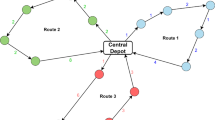Abstract
Despite many existing research studies for multi-objective scheduling, the problems of scheduling of large-scale construction projects are not solved with much success due to the many computational complexities. The primary purpose of presented paper is to deliver a discrete opposition-based non-dominated sorting genetic algorithm III (D-OBNSGA III) method-based robust multi-objective scheduling model (RMOSM) for small, medium and large-scale construction projects. With the multi-mode activities and discrete resources as major constraints in project, the developed RMOSM is designed to estimate the Pareto-optimal solutions for projects’ scheduling in terms of combinations of optimum execution modes of construction activities. For the first time, instances of time–cost-resource-quality-safety-environmental impact trade-off (TCRQSET) problems involving up to 1260 activities are solved in paper to reveal the applicability of developed model. Generating the high-quality solutions with minor average percentage deviation (APD) from ideal point within seconds, is the main advantage of using developed RMOSM for solving the large-scale multi-objective scheduling problems (MOSPs). Moreover, comparison with existing scheduling models, value path plots analysis, correlation analysis and sensitivity analysis of algorithm attract the construction managers to use the developed model in scheduling of real-life construction projects.




Similar content being viewed by others
Data availability statement
Some or all data, models, or code that support the findings of this study are available from the corresponding author upon reasonable request.
References
Afshar, A., Kaveh, A., & Shoghli, O. R. (2007). Multi-objective optimization of time-cost-quality using multi-colony ant algorithm. Fuzzy Sets and Systems, 8(2), 113–124.
Afshar, A., & Dolabi, H. R. Z. (2014). Multi-objective optimization of time-cost-safety using genetic algorithm. International Journal of Optimization in Civil Engineering., 4, 433–450.
Agdas, D., Warne, D. J., Osio-Norgaard, J., & Masters, F. J. (2018). Utility of genetic algorithms for solving large-scale construction time-cost trade-off problems. Journal of Computing in Civil Engineering. https://doi.org/10.1061/(asce)cp.1943-5487.0000718
Aminbakhsh, S., & Sonmez, R. (2016). Discrete particle swarm optimization method for the large-scale discrete time-cost trade-off problem. Expert Systems with Applications, 51, 177–185. https://doi.org/10.1016/j.eswa.2015.12.041
Babu, A. J. G., & Suresh, N. (1996). Project management with time, cost, and quality considerations. European Journal of Operational Research. https://doi.org/10.1016/0377-2217(94)00202-9
Banihashemi, S. A., Khalilzadeh, M., Zavadskas, E. K., & Antucheviciene, J. (2021). Investigating the environmental impacts of construction projects in time-cost trade-off project scheduling problems with cocoso multi-criteria decision-making method. Sustainability (switzerland). https://doi.org/10.3390/su131910922
Banihashemi, S. A., & Khalilzadeh, M. (2020). Time-cost-quality-environmental impact trade-off resource-constrained project scheduling problem with DEA approach. Engineering, Construction and Architectural Management, 28(7), 1979–2004. https://doi.org/10.1108/ECAM-05-2020-0350
Cheng, M., Asce, A. M., Tran, D., & Asce, A. M. (2014). Opposition-Based Multiple-Objective Differential Evolution to Solve the Time – Cost – Environment Impact Trade-Off Problem in Construction Projects. https://doi.org/10.1061/(ASCE)CP
Deb, K., & Agrawal, R. B. (1994). Simulated binary crossover for continuous search space. Complex Systems, 9, 115–148.
Deb, K., & Goyal, M. (1996). A combined genetic adaptive search (GeneAS) for engineering design. Computer Science and Informatics., 26, 30–45.
Deb, K., & Jain, H. (2014). An evolutionary many-objective optimization algorithm using reference-point-based nondominated sorting approach, Part I: Solving problems with box constraints. IEEE Transactions on Evolutionary Computation. https://doi.org/10.1109/TEVC.2013.2281535
Di, C., Sun, F. Q., Liu, S. X., & Wang, Y. F. (2013). Priority rule based heuristics for project scheduling problems with multi-skilled workforce constraints. 2013 25th Chinese Control and Decision Conference, CCDC 2013. https://doi.org/10.1109/CCDC.2013.6561233
Elazouni, A. (2009). Heuristic method for multi-project finance-based scheduling. Construction Management and Economics. https://doi.org/10.1080/01446190802673110
Elbeltagi, E., Ammar, M., Sanad, H., & Kassab, M. (2016). Overall multiobjective optimization of construction projects scheduling using particle swarm. Engineering, Construction and Architectural Management. https://doi.org/10.1108/ECAM-11-2014-0135
El-Rayes, K., & Kandil, A. (2005). Time-cost-quality trade-off analysis for highway construction. Journal of Construction Engineering and Management. https://doi.org/10.1061/(ASCE)0733-9364(2005)131:4(477)
El-Rayes, K., & Khalafallah, A. (2005). Trade-off between safety and cost in planning construction site layouts. Journal of Construction Engineering and Management. https://doi.org/10.1061/(ASCE)0733-9364(2005)131:11(1186)
Feng, K., Lu, W., Chen, S., & Wang, Y. (2018). An integrated environment-cost-time optimisation method for construction contractors considering global warming. Sustainability (switzerland), 10(11), 1–22. https://doi.org/10.3390/su10114207
Fu, F., & Zhang, T. (2016). A new model for solving time-cost-quality trade-off problems in construction. PLoS ONE. https://doi.org/10.1371/journal.pone.0167142
Ghoddousi, P., Eshtehardian, E., Jooybanpour, S., & Javanmardi, A. (2013). Multi-mode resource-constrained discrete time-cost-resource optimization in project scheduling using non-dominated sorting genetic algorithm. Automation in Construction. https://doi.org/10.1016/j.autcon.2012.11.014
Habibi, F., Barzinpour, F., & Sadjadi, S. J. (2018). Resource-constrained project scheduling problem: Review of past and recent developments. Journal of Project Management, 3, 55–88. https://doi.org/10.5267/j.jpm.2018.1.005
Habibi, F., Barzinpour, F., & Sadjadi, S. J. (2017). A multi-objective optimization model for project scheduling with time-varying resource requirements and capacities. Journal of Industrial and Systems Engineering, 10(November), 92–118. http://www.jise.ir/article_53352_9042ef5d84a68e667971a9b64eb6985d.pdf
Hegazy, T. (2002). Computer-Based Construction Project Management. In CIV E 596 – CONSTRUCTION MANAGEMENT. https://doi.org/10.1016/B978-0-12-408090-4.00008-6
Ipsilandis, P. G. (2007). Multiobjective linear programming model for scheduling linear repetitive projects. Journal of Construction Engineering and Management. https://doi.org/10.1061/(ASCE)0733-9364(2007)133:6(417)
Kallantzis, A., & Lambropoulos, S. (2004). Critical path determination by incorporating minimum and maximum time and distance constraints into linear scheduling. Engineering, Construction and Architectural Management. https://doi.org/10.1108/09699980410535813
Kaveh, A., & Laknejadi, K. (2011). A novel hybrid charge system search and particle swarm optimization method for multi-objective optimization. Expert Systems with Applications, 38(12), 15475–15488. https://doi.org/10.1016/j.eswa.2011.06.012
Kaveh, A., & Laknejadi, K. (2013). A new multi-swarm multi-objective optimization method for structural design. Advances in Engineering Software, 58, 54–69. https://doi.org/10.1016/j.advengsoft.2013.01.004
Kaveh, A., Fahimi-Farzam, M., & Kalateh-Ahani, M. (2015). Performance-based multi-objective optimal design of steel frame structures: Nonlinear dynamic procedure. Scientia Iranica, 22(2), 373–387.
Kaveh, A., Dadras, A., & Malek, N. G. (2018). Robust Design Optimization of Multilayered Sandwich Panel under Uncertain Bounded Buckling Loads. 1.
Kaveh, A., Izadifard, R. A., & Mottaghi, L. (2020). Optimal design of planar RC frames considering CO2 emissions using ECBO, EVPS and PSO metaheuristic algorithms. Journal of Building Engineering, 28, 101014. https://doi.org/10.1016/j.jobe.2019.101014
Kelley, J. E., & Walker, M. R. (1959). Critical-path planning and scheduling. Proceedings of the Eastern Joint Computer Conference, IRE-AIEE-ACM 1959. https://doi.org/10.1145/1460299.1460318
Khalili-Damghani, K., Tavana, M., Abtahi, A. R., & Santos Arteaga, F. J. (2015). Solving multi-mode time-cost-quality trade-off problems under generalized precedence relations. Optimization Methods and Software. https://doi.org/10.1080/10556788.2015.1005838
Khang, D. B., & Myint, Y. M. (1999). Time, cost and quality trade-off in project management: A case study. International Journal of Project Management. https://doi.org/10.1016/S0263-7863(98)00043-X
Leu, S. S., & Yang, C. H. (1999). A genetic-algorithm-based resource-constrained construction scheduling system. Construction Management and Economics. https://doi.org/10.1080/014461999371105
Liu, S., Tao, R., & Tam, C. M. (2013). Optimizing cost and CO2 emission for construction projects using particle swarm optimization. Habitat International, 37, 155–162. https://doi.org/10.1016/j.habitatint.2011.12.012
Lotfi, R., Yadegari, Z., Hosseini, S. H., Khameneh, A. H., Tirkolaee, E. B., & Weber, G. W. (2022). A robust time-cost-quality-energy-environment trade-off with resource-constrained in project management: a case study for a bridge construction project. Journal of Industrial and Management Optimization, 18(1), 375–396. https://doi.org/10.3934/jimo.2020158
Luong, D. L., Tran, D. H., & Nguyen, P. T. (2018). Optimizing multi-mode time-cost-quality trade-off of construction project using opposition multiple objective difference evolution. International Journal of Construction Management, 0(0), 1–13. https://doi.org/10.1080/15623599.2018.1526630
Ma, W., Che, Y., & Ke, H. (2016). Preemptive Multi-mode Resource-Constrained Discrete Time-Cost-Resource Optimization via Non-dominated Sorting Genetic Algorithm. In Proceedings of the 6th International Asia Conference on Industrial Engineering and Management Innovation. https://doi.org/10.2991/978-94-6239-145-1_68
Marzouk, M., Madany, M., Abou-Zied, A., & El-said, M. (2008). Handling construction pollutions using multi-objective optimization. Construction Management and Economics, 26(10), 1113–1125. https://doi.org/10.1080/01446190802400779
Mungle, S., Benyoucef, L., Son, Y. J., & Tiwari, M. K. (2013). A fuzzy clustering-based genetic algorithm approach for time-cost-quality trade-off problems: A case study of highway construction project. Engineering Applications of Artificial Intelligence. https://doi.org/10.1016/j.engappai.2013.05.006
Ozcan-Deniz, G., Zhu, Y., & Ceron, V. (2012). Time, cost, and environmental impact analysis on construction operation optimization using genetic algorithms. Journal of Management in Engineering. https://doi.org/10.1061/(ASCE)ME.1943-5479.0000098
Panwar, A., & Jha, K. N. (2019). A many-objective optimization model for construction scheduling. Construction Management and Economics. https://doi.org/10.1080/01446193.2019.1590615
Panwar, A., & Jha, K. N. (2021). Integrating quality and safety in construction scheduling time-cost trade-off model. Journal of Construction Engineering and Management, 147(2), 04020160. https://doi.org/10.1061/(asce)co.1943-7862.0001979
Panwar, A., Tripathi, K. K., & Jha, K. N. (2019). A qualitative framework for selection of optimization algorithm for multi-objective trade-off problem in construction projects. Engineering, Construction and Architectural Management. https://doi.org/10.1108/ECAM-06-2018-0246
Rahnamayan, S., Tizhoosh, H. R., & Salama, M. M. (2008). Opposition-based differential evolution. Studies in Computational Intelligence. https://doi.org/10.1007/978-3-540-68830-3_6
Senouci, A. B., & Eldin, N. N. (2004). Use of genetic algorithms in resource scheduling of construction projects. Journal of Construction Engineering and Management. https://doi.org/10.1061/(ASCE)0733-9364(2004)130:6(869)
Sharma, K., & Trivedi, M. K. (2020). Latin hypercube sampling-based NSGA-III optimization model for multimode resource constrained time–cost–quality–safety trade-off in construction projects. International Journal of Construction Management. https://doi.org/10.1080/15623599.2020.1843769
Sharma, K., & Trivedi, M. K. (2021). Development of Multi-Objective Scheduling Model for Construction Projects Using Opposition-Based NSGA III. Journal of The Institution of Engineers (India): Series A. https://doi.org/10.1007/s40030-021-00529-w
Sharma, K., & Trivedi, M. K. (2022). AHP and NSGA-II-Based Time–Cost–Quality Trade-Off Optimization Model for Construction Projects. 45–63. https://doi.org/10.1007/978-981-16-1220-6_5
Storn, R., & Price, K. (1997). Differential evolution - a simple and efficient heuristic for global optimization over continuous spaces. Journal of Global Optimization. https://doi.org/10.1023/A:1008202821328
Tiwari, A., Sharma, K., & Trivedi, M. K. (2022). NSGA-III-Based Time–Cost–Environmental Impact Trade-Off Optimization Model for Construction Projects. 11–25. https://doi.org/10.1007/978-981-16-1220-6_2
Toğan, V., & Eirgash, M. A. (2019). Time-cost trade-off optimization of construction projects using teaching learning based optimization. KSCE Journal of Civil Engineering, 23(1), 10–20. https://doi.org/10.1007/s12205-018-1670-6
Wang, T., Abdallah, M., Clevenger, C., & Monghasemi, S. (2021). Time–cost–quality trade-off analysis for planning construction projects. Engineering, Construction and Architectural Management, 28(1), 82–100. https://doi.org/10.1108/ECAM-12-2017-0271
Xu, J., Zheng, H., Zeng, Z., Wu, S., & Shen, M. (2012). Discrete time-cost-environment trade-off problem for large-scale construction systems with multiple modes under fuzzy uncertainty and its application to Jinping-II Hydroelectric Project. International Journal of Project Management. https://doi.org/10.1016/j.ijproman.2012.01.019
Zahraie, B., & Tavakolan, M. (2009). Stochastic time-cost-resource utilization optimization using nondominated sorting genetic algorithm and discrete fuzzy sets. Journal of Construction Engineering and Management. https://doi.org/10.1061/(ASCE)CO.1943-7862.0000092
Zhang, L., Du, J., & Zhang, S. (2014). Solution to the time-cost-quality trade-off problem in construction projects based on immune genetic particle swarm optimization. Journal of Management in Engineering. https://doi.org/10.1061/(ASCE)ME.1943-5479.0000189
Zheng, H., & Zhong, L. (2017). Discrete time-cost-environment trade-off problem and its application to a large-scale construction project. Advances in Intelligent Systems and Computing, 502, 1375–1382. https://doi.org/10.1007/978-981-10-1837-4_111
Zhou, J., Love, P. E. D., Wang, X., Teo, K. L., & Irani, Z. (2013). A review of methods and algorithms for optimizing construction scheduling. Journal of the Operational Research Society, 64(8), 1091–1105. https://doi.org/10.1057/jors.2012.174
Funding
The authors received no financial support for the research, authorship and/or publication of this article.
Author information
Authors and Affiliations
Contributions
Kamal Sharma and Manoj Kumar Trivedi both conducted the research work together and wrote the manuscript.
Corresponding author
Ethics declarations
Conflict of interest
Authors report no potential conflict of interest with any person and organization.
Additional information
Publisher's Note
Springer Nature remains neutral with regard to jurisdictional claims in published maps and institutional affiliations.
Supplementary Information
Below is the link to the electronic supplementary material.
Rights and permissions
Springer Nature or its licensor (e.g. a society or other partner) holds exclusive rights to this article under a publishing agreement with the author(s) or other rightsholder(s); author self-archiving of the accepted manuscript version of this article is solely governed by the terms of such publishing agreement and applicable law.
About this article
Cite this article
Sharma, K., Trivedi, M.K. Discrete OBNSGA III method-based robust multi-objective scheduling model for civil construction projects. Asian J Civ Eng 24, 2247–2264 (2023). https://doi.org/10.1007/s42107-023-00638-w
Received:
Accepted:
Published:
Issue Date:
DOI: https://doi.org/10.1007/s42107-023-00638-w




